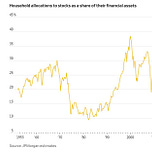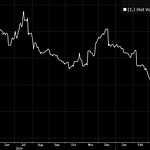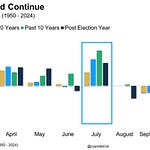To investors,
Inflation has been the story of the decade so far. We went from sub-2% in early 2020 to over 9% by the summer of 2022. Today, one of economists favorite metrics sits at just under 3%.
This roller coater ride has had a significant impact on asset prices and investor psychology. On one hand, investors who have been allocated to the stock market continue to see their portfolio value increase as indexes push higher. The classic adage “time in the market is more important than timing the market” stands for a reason.
The S&P 500 is up 85% over the last 5 years. Russell 2000 has appreciated 42% and the Nasdaq 100 is up 141% during the same time period. Investors simply had to invest in indexes and chill. Monetary and fiscal policy did the rest for them — inflation took off, the dollar was devalued, and asset prices went up.
As stocks went higher, investors gained more confidence that higher prices were just around the corner. Add in the fact that existing capital in the market was also gaining value and you can see how we arrive at the new all-time high of stock allocation as a percent of financial assets.
Wall Street Journal's Gunjan Banerji writes yesterday:
“The surging stock market has minted millionaires and helped send many Americans’ net worth sharply higher. As of the second quarter, the number of 401(k) retirement accounts at Fidelity Investments worth at least $1 million reached around 497,000, according to the firm. That is up 31% from a year ago and a record high.
U.S. households’ stock allocations have steadily inched up this year, according to JPMorgan estimates, and recently accounted for around 42% of their total financial assets. That is the most on record in data going back to 1952.”
There is a debate raging due to this data — are investors merely riding the trend that will continue for the foreseeable future or are investors over-confident and a market correction is just around the corner?
The short answer is no one knows, but I think the framework for evaluating the situation is wrong. Only short-term oriented investors should be concerned about the week-to-week or month-to-month oscillations in the stock market.
Majority of investors should simply have a long-term orientation. They can be oblivious to price movements and merely continue dollar cost averaging into their preferred index. Given enough time, the stock market will continue going higher and is essentially guaranteed to be at new all-time highs.
The United States debt requires dollar devaluation, which in turn pushes all assets denominated in dollars to be worth more in dollar terms.
So the only people in the market who should be worried about short-term price movements are older folks who have less time to benefit from. Anyone under the age of 50 years old has at least a decade, and probably longer, to weather potential market downturns.
The beauty of ignoring short-term predictions is that an investor is exposed to the market if prices go up and they are continuing to dollar cost average if the market goes down. If the market is up, your portfolio is worth more. If the market is down, you are buying more assets at cheaper valuations.
Regardless of the scenario, being long the US stock market over decades is a cheat code — the US stock market is the greatest millionaire minting machine ever created.
You just have to be able to allocate capital, stomach volatility, and stay focused on the long-term. And based on the latest data, it looks like more Americans are deciding to go long stocks. We’ll see what they do if there is turbulence in the coming months.
Hope you all have a great day. I’ll talk to everyone tomorrow.
-Anthony Pompliano
Founder & CEO, Professional Capital Management
Reader Note: BUILD Summit, our annual conference in NYC for founders, is coming up next month on September 26th.
The event will provide top tier speakers, networking opportunities, and insightful business discussions on raising capital, scaling businesses, and building products.
Current speakers include angel investor Balaji Srinivasan, Khosla Ventures’ Keith Rabois, Perplexity CEO Aravind Srinivas, Eight Sleep Founders Matteo Franceschetti & Alexandra Zatarain, and Passes CEO Lucy Guo.
The event is free to attend and will be full of insights on how to operate a company at world-class level.
Darius Dale is the founder & CEO of 42Macro.
In this conversation, we discuss inflation, productivity, asset prices, political impact, federal reserve interest rate decisions, and outlook for 2024.
Listen on iTunes: Click here
Listen on Spotify: Click here
Darius Dale Explains Why Inflation May Come Back In Q1
Podcast Sponsors
Gemini is the safe and secure way to trade crypto. Use code Pomp100 and start trading crypto to earn $100 in BTC.
Xapo - Xapo Bank is the only way to bank with Bitcoin.
CrossFi is the Apple Pay for Crypto. For the first time in history, anyone with a web 3 wallet can spend crypto through a physical or virtual Visa card where Visa is accepted.
Domain Money makes financial planning straightforward and accessible.They tailor plans to your personal priorities and goals, whether it’s buying a house, funding college, or taking that dream vacation.
iTrustCapital allows you to buy and sell cryptocurrency in a tax-advantaged crypto IRA. Open and fund an account today to receive a $100 USD funding bonus.
ResiClub - Your data-driven gateway to the US housing market.
Professional Capital Management - Anthony Pompliano’s asset management firm is now on Linkedin. Please subscribe by clicking here.
You are receiving The Pomp Letter because you either signed up or you attended one of the events that I spoke at. Feel free to unsubscribe if you aren’t finding this valuable. Nothing in this email is intended to serve as financial advice. Do your own research.














Share this post